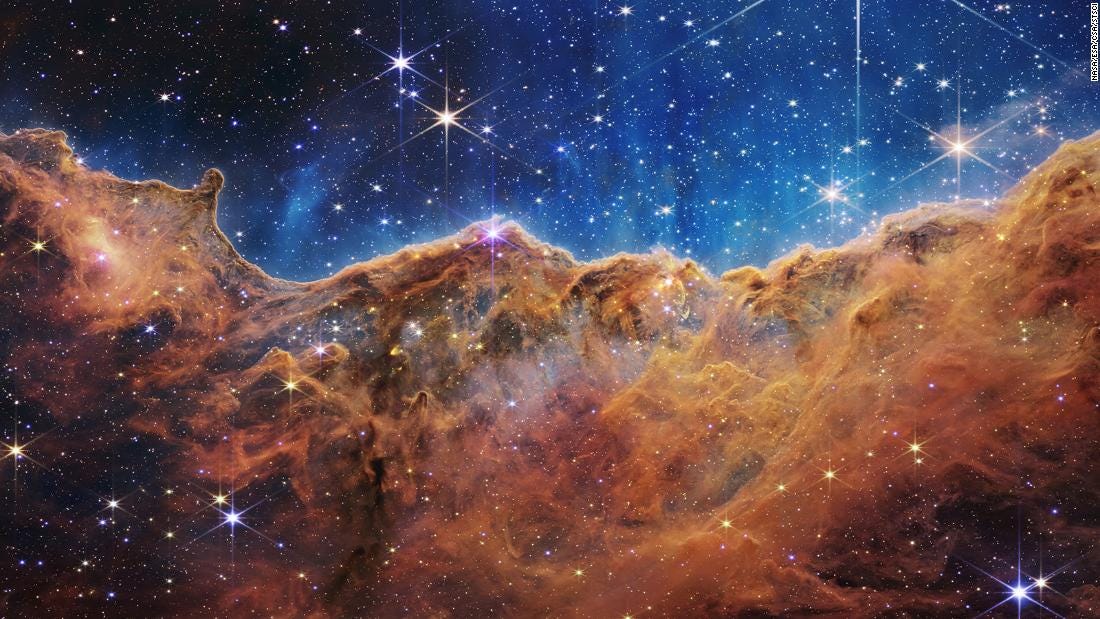It was only three decades ago that astronomers first discovered planets outside our solar system. Since then, astrophysicists have found more of these "exoplanets" — including some Earth-like worlds that exist in their star's habitable zone. Today, astronomy has moved far beyond pointing a lens at the night sky, so I've brought on Gioia Rau to describe her work on exoplanets, as well as how AI and recent declines in launch costs will change astronomy.
Gioia is an astrophysicist and program scientist at Schmidt Futures. Previous to joining Schmidt Futures, Gioia was a research scientist at NASA’s Goddard Space Flight Center.
In This Episode
NASA’s exoplanet discoveries (1:19)
Innovation in telescopes and astronomy (5:57)
The near future for astronomy (16:02)
Americans’ enthusiasm for space (22:04)
Below is an edited transcript of our conversation.
NASA’s exoplanet discoveries
James Pethokoukis: When I hear that there's been a discovery, that NASA has discovered an Earth-sized world inside the habitable zone of its star, I think, are there people there? Is there intelligent life there? When you hear that, what do you think? What strikes you? What are the implications you draw? What do you want know more of?
Gioia Rau: That's a great question. As a scientist, I have many questions after this discovery. I would like to … discover which other molecules are in there. I would like to understand better what the size of this planet [is], what is its atmosphere and its surroundings. But as a human, as a person, and also as a scientist, it completely blows my mind. I'm so excited by the multiple discoveries. The James Webb Space Telescope is great to understand the atmosphere of these exoplanets, but what really kept us going from zero to 5,300—where we are now in terms of how many exoplanets have been confirmed—is first Kepler and then TESS.
What is TESS?
TESS is another telescope of NASA. It has discovered many, many exoplanets. It has scanned both atmospheres of the sky. And actually, at NASA, my group has used TESS with light curves … [and a] neural network, and so through artificial intelligence we were able to discover 181 new planet candidates. Those are incredible machines. Let's say TESS is our searcher, but then to really understand what is in there, what's the composition of this planet, we need …
How many Earth-like, in a very broad sense, worlds have we found that are in habitable zones?
That’s a very good question, and I don't have the number on the top of my head, but those are just a bunch.
At some point we had discovered none. And it wasn't that long ago that we probably had not discovered any of these?
Right. The difficulty is in defining what is Earth-like. There are multiple meanings of this. One is the distance from the parent star that is similar to the distance between the Earth and our own sun. So this is called a “habitable zone.” But another measure of Earth-like is the size of the planet, or the fact that it's rocky versus gaseous. Definitely, TESS is the telescope that has helped us a lot with such discoveries.
And even before we had found any of these, I imagine there was considerable speculation that obviously they had to exist, there had to be all kinds of planets outside our solar system. But we had not discovered them. And yet, I imagine it's been a pretty wonderful run we've had from going from pure speculation to beginning to analyze what these planets, whether they're Earth-sized or not, what other worlds are like.
Absolutely, and it's just about 30 years, 33 years, that we’ve known that, actually, other planets, exoplanets—which by definition are planets outside our own solar system—exist. Before it was, as you mentioned, just a speculation. But the first ever planet was discovered around 33 years ago. And so since then, really our revolution began. And, actually, these two scientists that co-authored and discovered the first exoplanet have just recently been awarded the Nobel Prize.
Innovation in telescopes and astronomy
It might seem to some people that NASA hasn't really done much since the Apollo program. But there's a lot more to space science than crewed missions. It seems to me like NASA’s doing a whole lot of things right now.
Absolutely. The time we are living now is a time of revolution for so many aspects in space exploration. Not only human exploration, which of course during the Apollo time peaked, and now hopefully also with the Artemis mission, named after the sister of Apollo in Greek mythology, is coming. But the James Webb Space Telescope, which is really a marvel of engineering. We never before have thought that we could put a telescope inside the rocket like an origami and then deploy it in the atmosphere. And we are discovering with Webb so many different things about the universe. Our early universe: Webb is basically a machine to look back in time. With its infrared vision, we will be able to look back over 13.5 billion years. But also with Webb we can discover galaxies over time, again, with the infrared sensitivity. So to discover even the earliest and faintest galaxies. We can discover the life cycle of the stars, as in the infrared, Webb which is able to look through the dust clouds which are otherwise opaque to the visible light. But also we are, as we mentioned before, able to see the atmosphere of these exoplanets, and so understand if in there there are building blocks of life elsewhere in the universe, but also understand how our own solar system was formed.
Currently, we're learning about exoplanets through astronomy. We aren't sending probes. Are we nearing the point where there isn't much we can learn without getting closer to these worlds? Or can you imagine further innovations which would allow us to learn a lot more about an exoplanet without sending something there?
This is a great question. We had Hubble in the past, the Hubble Space Telescope, through Kepler and TESS, now with James Webb and in the future with the Nancy Grace Roman Space Telescope, we will be able to understand so many different aspects of the “zoology” of this planet, so to say, but also on the composition of the atmosphere and so on. And so basically up to now, [there are] five principle methods to discover exoplanets. For example, one of those is transit, the method that Kepler and TESS use; but another one is gravitational microlensing, which the Nancy Grace Roman Space Telescope will use.
Now, what is that?
Gravitational microlensing is basically an observational effect that was predicted in 1936 by Einstein using the theory of general relativity. But this effect was never actually proved up to now in space. Basically when one star in the sky passes near or in front of another, then the light rays of the background star become basically bent due to the gravitational force, the gravitational attraction of the foreground star. And so this star then is actually acting as a virtual magnifying glass or a lens, and so it amplifies the brightness of the background source star. And so we refer to the foreground star as a lens star, and if the lens star harbors a planetary system, so an exoplanetary system, then those planets can actually also act as lenses, and so each of these planets will be producing a sharp division in the brightness of the source. And so we discovered the presence of each of the planets in this way, and we are able to measure also its mass and separation from the star. And this technique also tells us how common Earth-like planets are. This is a great method for Earth-like planets and has guided also the design of this future space mission, the Nancy Grace Roman Space Telescope.
What would you like to be able to find out about an exoplanet, that you currently can't, but you think you might be able to 10 years from now or 20 years from now?
There are several aspects that are currently unknown, probably what we need the most, that the Roman space telescope will also help us understand—Roman will be launched in May, 2027, according to the forecast, and it'll be operational a few months after—but basically Roman will have a wide field instrument that will bring us a panoramic view, a wide field of view, that is 200 times larger than Hubble Space Telescope in the infrared. It will also combine the power of imaging and spectroscopy, and so in this way, we will uncover thousands of exoplanets beyond our own solar system. We will have basically a sense of the “zoology” of the exoplanets, but also, we will have in the future, hopefully, much higher resolution of spectroscopy which will really [help us] understand what molecules are there beyond what JWST is able to tell us. And also if there is water, if we can go there, considering that many of these planets are not that far away, I mean in an astronomical point of view, right? They are just a dozen or hundreds of light years away, which is not that far away.
How did you get involved in this to begin with? As a kid were you a space nut, you loved reading about it or watching documentaries? What got you interested in the field?
Since I was a little kid, I was literally dreaming about space. I was very curious about everything about science in general. But something about space was extremely fascinating for me. This feeling of looking at the universe and feeling small in comparison of the immensity of the cosmos, dreaming of exploration while watching the space shuttle launches in the ‘90s. And also, you know, this question that we are still trying to uncover: What is out there? How does the universe work? How did we get here? Those were all fascinating to me as a kid. And yes, since I [was] very little kid, I wanted to work for NASA. I even wrote NASA a letter when I was about age eight. I wanted to attend their summer camp—obviously from my accent, I was not born in the US, so unfortunately at the time, it was precluded for foreigners to attend their summer camps. But they wrote me back. They were like, “Study and one day you'll come back here.” And so I didn't give up.
And just explain a little bit about the thrust of your work now at Schmidt Futures.
At Schmidt Futures we do several things for astronomy in general and for space. Fascination of space, of course, drove me to do research. Like very hands-on research. And then of course, I evolved and I started to lead research groups and to have my own students and interns and so on, which I love. I love to mentor young students and get them inspired to do science. But then also I like this more managerial or programmatic aspect, at Schmidt Futures we are really forging what the future of astronomy and astrophysics will be in the next five, 10 years and beyond. And so this has been extremely thrilling to me.
The near future for astronomy
You were talking about how this is kind of a revolutionary period in space science. How important in this period, and let's say over the next decade, are two things? (1) Artificial intelligence to help process all this data, and (2) the fact that it's getting cheaper to put probes in space and put telescopes in space. I imagine those costs are going to continue to come down.
Absolutely. I believe that the future of astronomy and astrophysics in general will be about an accelerated timeline and about cutting, drastically, costs. And so this is where also I really want to focus, especially for future of astrophysics. Concerning artificial intelligence and its use in astronomy, this is truly revolutionizing how we do astronomy. NASA is doing a lot in this sense. As I mentioned earlier, through AI we discovered a bunch of new planet candidates. But AI in general is revolutionizing astronomy in many ways from understanding cosmology to understanding the shape of galaxies and how they form. And I'm noticing more and more AI-based applications to the exploration of astronomical data. And so this is definitely, I believe, the future of astronomy. In a decade or so there will be more AI-based applications to analyze astronomical data than manual ones.
I know there's ideas about putting a variety of telescopes on the Moon. And there's all this concern lately about our sky being cluttered with satellites, and a lot of astronomers are complaining about the Elon Musk Starlink, that it's obscuring views. But I would imagine that putting some kind of telescope—and radio telescopes, I imagine a variety of them—that would be helpful, right? Putting them on the Moon as opposed to having them on Earth?
Oh yeah, absolutely. Actually, I believe that the future of [ground]-based astronomy, as we call it, versus space-based—“space-based” are all the telescopes that [orbit] around earth or in space …, versus [ground]-based are the telescope that we build on Earth—but the future of space-based astronomy is actually from the Moon and also beyond the Moon. In particular, for the radio wavelength domain, our radio telescope on the far side of the Moon will have tremendous advantages compared to Earth-based and also Earth-orbiting telescopes. For example, such a telescope could observe the universe at wavelengths greater than 10 meters, which are reflected actually by Earth’s ionosphere and so are up to now completely, largely unexplored by humans. But also the Moon acts as a physical shield that isolates the lunar surface telescope from any radio interferences or noises from the Earth-based sources, from the ionosphere and from Earth-orbiting satellites, and also from the sun's radio noise, during the lunar night. And so, such a radio lunar-based telescope will enable tremendous scientific discoveries, for example, in the field of cosmology, by observing the early universe in this range of 10- to 50-meter wavelength span, which has been unexplored completely by humans to date.
Is there any film that you think portrays what you do at all realistically? If the answer is no, what space, science-fiction movies do you find inspirational? I'm guessing maybe Contact, but maybe there are some others?
Exactly. Contact inspired me when I was growing up for several reasons. I started during the holiday—but I didn't have the time to finish it—to watch Don't Look Up. But I watched the first half an hour, and I have to say that Leonardo DiCaprio was very much into the professor type. And so all the dynamics that happened had a scientific but also a bureaucratic level, so to say. But since we are talking about movies, a movie that I love, and it's really inspirational for very many points of view, is Interstellar. Many scientists will say that it’s a movie that is completely wrong and so forth. When I watch a movie, I like to watch a movie as a person detached from my scientific point of view, just because it's a movie and it's fiction. Many movies are completely untrue for several aspects, so why are we going to investigate how physically true it is? It’s a movie, right? We need to enjoy it.
Americans’ enthusiasm for space
When you're traveling and you tell people what you do, I imagine people are pretty enthusiastic, because my theory is that people are super interested if we popularize and we let people know what actually is happening. There's been a lot happening other than Moon landings over the past half century, and maybe a lot more happening over the next 10 or 20 years.
Absolutely, yeah. I completely agree with you. When I travel and I get to speak with people and “What do you do?” I say I'm an astrophysicist. It blows their mind just because people don't have any idea about actually what we do. They think that we look through a telescope. That’s part of what we do in the free time, maybe. But the reality is way beyond that. I believe space is such a source of huge inspiration for mankind, for all of us. And so it's definitely on us, the scientists, astrophysicists, to be a great outreach source, to be great communicators, to make space and science in general more accessible and comprehensible to society and to all people. This will benefit the knowledge of all, but also it'll benefit science as a return of making it more accessible, more comprehensible.
When was the last time that you looked into the IP of a physical telescope? Was it 20 years ago? Was it yesterday?
Fun fact: for my nephews, the sons of my brother—they’re twins—for their birthday I gave them a small, few inches refractor Newtonian telescope, and so now that they went off to college, they were like, “Hey aunt, you want it?” And I was like, “Are you sure? Because I will say yes.” And so with our very young daughter we've looked at it very recently, so it was not that so long ago. That's why I say it's something that we do in our free time, and many astrophysicists have this passion also to have more telescopes or to be astrophotographers, because this is a passion of many of us. In general, coming back to what you said before, and why space is important and why the US, with all the problems that are in the world, why we should actually invest in space and use this money there and not on other problems: First of all, I hope it was clear that all of this space can be very inspiring for young kids and to motivate them, but also for adults to look at the beauty of our universe, and also as a reminder to us all to be humble. We are just one extremely small piece in the huge cosmic puzzle of the universe. But also there are so many other benefits of space exploration: [NASA’s impact on the US economy], how when we apply ourselves to the challenges of space exploration, we make discoveries that can help the world in many ways. For example, studying how food grows in orbit or on Mars might yield insight into growing food in extreme conditions on Earth or when climate change will hit even harder.
Also, now the budget is not that expensive. It's only about 0.5 percent of the total federal budget. It's even smaller than for other nations. And also a cosmic perspective can also give us insight on the importance of protecting our own planet’s sustainability and so encouraging investments and efforts then. And not to mention, of course, that studying space may one day save us all. And so we have to explore space to find and study asteroids and comets in our cosmic neighborhoods to defend our own Earth and to understand that, actually, Earth is unique in its habitability up to now.












